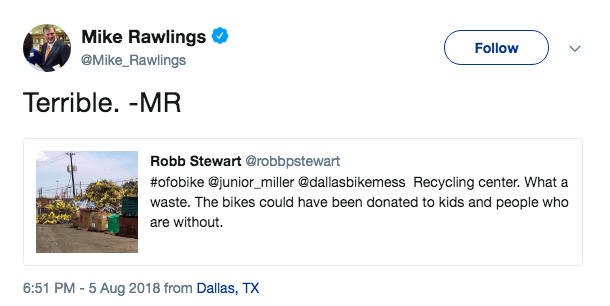Right now, there are a few thousand dockless bikes and scooters on the streets of Austin from several different companies – Lime, Bird, Pace, GOAT, JUMP, Spin, VeoRide.
But what happens to all of those bikes/scooters if one of these companies goes out of business, or just decides to leave Austin?
We’ve seen this play out in real time with the departure of Ofo, a China-based dockless bike company that pulled out of many North American cities in July. In Dallas, their departure created a public uproar when a photo of a massive pile of Ofo bikes sitting at a recycling center went viral. As the Dallas Morning New reported, at one point, there were 5,000 Ofo bikes on the city’s streets. A few hundred were donated to local nonprofit organizations, but it seems as if many were sold off for scrap.
In Austin, it’s been a bit of a different story. For starters, we had a lot less Ofo bikes on the streets in the first place. (As the Austin Business Journal reports, a little over 300.)
Austin also has the Yellow Bike Project, a nonprofit organization that works to get more bikes on the streets of Austin by operating community bike shops, teaching bike mechanics and maintenance, and acting as a local bike advocacy group.
When Ofo left Austin, they donated the bulk of their bikes to the Yellow Bike Project, who is doing some retrofitting work before donating them to other local nonprofit organizations.
In response, Drew Berger (a volunteer coordinator with the Yellow Bike Project) launched an online fundraiser to raise the money needed to retrofit the bikes. Although the bikes are in pretty good shape, they do utilize some non-standard fasteners and pieces of hardware (in order to prevent theft).
However, now that the Yellow Bike Project is handing out the bikes to the general population, they want to remove these funky pieces so that the average user can fix and repair their own bike over the years. The fundraiser will allow the Yellow Bike Project to purchase the special tools needed to remove the non-standard hardware, as well as to purchase new hardware for the bikes.
After the bikes are rehabbed, they’ll be donated to several local nonprofit organizations that the Yellow Bike Project regularly works with, including Casa Marianella and Community First Village.
As Drew told the Austin EcoNetwork, he sees this donation as a good thing for the Yellow Bike Project and for Austin in general because it will provide hundreds of people with a free bike.

Ofo bikes stacked at the Yellow Bike Project, waiting to be refurbished and donated to Austinites in need
However, the situation does raise several questions about the future of dockless bikes in Austin and in cities throughout the US. Who is ultimately responsible for these bikes/scooters when a company leaves town or goes out of business? What’s the best way to ensure that bikes aren’t thrown away or littered throughout the street? Should regulations be passed ensuring that bikes are reused? Or should less formal partnerships be set up to encourage companies to donate their bikes after they’re done using them?
These are amongst the questions that city officials and the public are asking themselves as Austin looks to finalize its dockless mobility rules.
As you might remember, in order to respond to the rapid deployment of dockless bikes/scooters, the City of Austin passed a series of emergency rules in May.
They said that each company:
- Must pay a $30 fee (for a 6 month license) for each bike/scooter they put on the street
- Is capped at 500 bikes/scooters, or 500 of each, if they offer both. (There is also an opportunity to put more bikes/scooters on the street as long as they’re placed in areas outside of the central downtown district.)
- By August 1st, all companies must have equipment that allows them to be locked to a bike rack or technology that tells riders if they have parked in designated, geo-fenced (aka a virtual fence) parking areas. (After meeting with the dockless companies, the city manager has decided to delay enforcing this rule until more can be known about the technological and industry barriers that might prevent a company from equipping their vehicles with these locks.)
- Must submit usage data to the city. If each scooter/bike isn’t being used an average of two times per day, the city can require the company to remove or relocate the device
- Must have insurance and submit a performance bond of $100 per vehicle
Now the city is taking the time to reevaluate these rules and decide what needs to be changed, added, or remain the same. They’re running an online public survey (which you can take here) and in September, they’ll be releasing a draft of the final dockless rules. That release will be followed by a public comment period (during which you’ll be able to give your input) before a final rule in adopted in late October.
The city is also hosting several briefings/public meetings on dockless bikes and scooters, which you can attend. They include:
- Bicycle Advisory Council Briefing – August 21st
PS – Want to help the Yellow Bike Project rehab the donated Ofo bikes? Keep an eye out on their Facebook page and website for information about an upcoming volunteer day.


